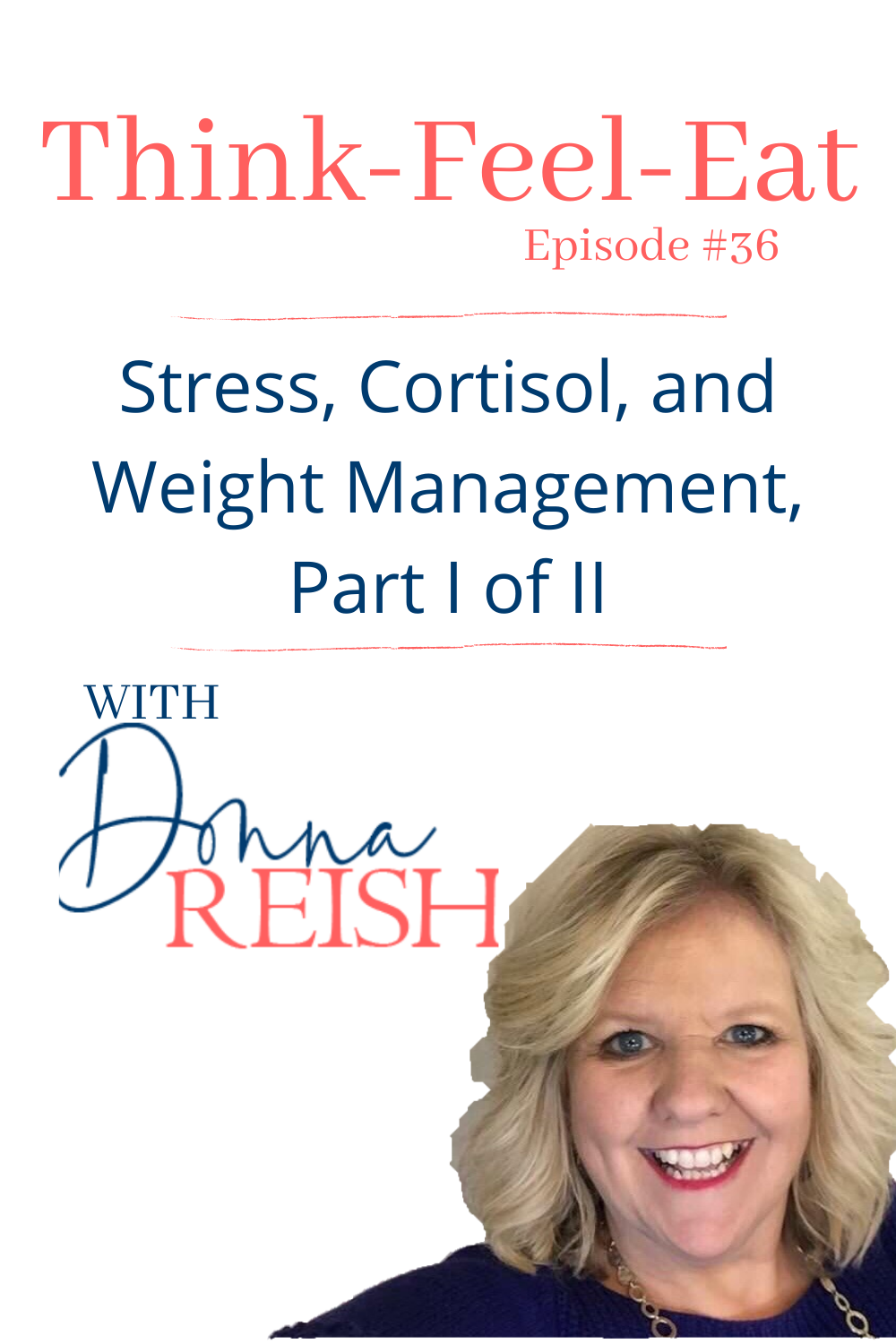Hi! I’m Donna Reish, IF teacher, weight loss coach, blogger, and half of “The Minus 220 Pound Pair” as my husband and I have lost over 220 pounds together (160 of that in the past couple of years through the Weight Loss Lifestyle habits and strategies I teach!).
In this episode, I present Part I of II of Stress, Cortisol, and Weight Mangement.
Turns out, the main factor in weight loss is creating a calorie deficit. That is, we eat more like our new sized body needs.
Turns out, the main factor in creating said deficit is choosing a protocol that you can stick to.
AND…turns out, there are other factors that can slow or hinder weight loss, fat loss, cravings, overeating, the desire to move, and more.
These include sleep (TFE #34) and stress/cortisol, among other things.
I’m excited to be delving into this topic with my listeners/readers. This week I examined what stress and cortisol can do to weight. Next week I will unveil things we can do about stress and high cortisol.
In today’s episode:
1. Stress and cortisol defined
2. Hormones and neurotransmitters
3. Studying stress and cortisol via people with Cushing Syndrome
4. Obesity and cortisol
5. Muscle loss and cortisol
6. Emotional eating—how chronic stress affects appetite
7. Stress eating
Find all of my episodes, outlines, and articles for my two weekly broadcasts:
(1) Weight Loss Lifestyle broadcast (formerly Donna’s Intermittent Fasting Broadcast) https://donnareish.com/intermittent-fasting-journal-index/
(2) Think-Feel-Eat broadcast at https://donnareish.com/think-feel-eat/
Sign up for my free webinar: https://intermittentfastingwebinar.com
Listen to episode at iTunes here: https://podcasts.apple.com/us/podcast/think-feel-eat/id1498498769
Think Feel Eat Outline 36: Stress, Cortisol, and Weight Management, Part I of II
A. Stress and Cortisol Defined
1. Stress
a. Makes fat loss hard
b. Can be anything that threatens our safety, status, well being
c. Can be anything that initiates physical or psychological demands that are above our ability to handle them
d. Can be unpredictable change in environment
e. Can be an inconsistency between our expectations and actual outcomes
f. Can be real or perceived
g. Different for all people
h. Response based on our experiences with that stressor
i. When stress occurs, we have emotional responses
i. Feelings of uneasiness
ii. Impending doom
iii. Rumination/worry
iv. Desire to avoid the stress
j. When stress occurs, we have physiological responses
i. Body bloods with adrenaline and noradrenaline—fight/flight…for a few seconds
ii. When this happens, we respond/rise to the challenge
iii. This is why people are given adrenaline to wake them up, etc. when injured
iv. When we have a stress, we also release cortisol
2. Cortisol
a. Stress hormone that turns into neurotransmitter—turns into “steroids”
b. Slow acting but long lasting
c. Broken down in the body to give energy when needed
d. Helps recovery when emergency is over
e. Suppresses inflammation (i.e. cortisol shots and creams)
f. The stomach has four times the number of cortisol receptors as anyplace else—thus, the belly fat from chronic stress and high cortisol.
3. Stress and cortisol different nowadays than early man
a. Only had cortisol for short periods of time before
b. Now we get stressed frequently and have high cortisol for longer periods, sometimes chronically
4. Ari Whitten, Fat Loss Blueprint
a. Course I have recently taken
b. Learned a lot about stress, cortisol, and sleep from it
c. Many of the studies I refer to here were explained in that course
B. Hormones and Neurotransmitters
1. General
a. Stress hurts our weight loss efforts by taking down our two main communication pathways—hormones and neurotransmitters
b. Neurotransmitters used by nervous system to transmit messages from brain to muscles, glands, etc.
c. Hormones special chemical messengers secreted into blood and travel to give messages
2. Dopamine
a. Motivation and reward
b. Most addictive behaviors controlled by it
c. Plays role in learning, motor control, emotion and executive functions
3.Seratonin
a. Regulates brain development
b. Also has effect on sleep, mood, memory, aggression, and more
4. Stress/cortisol release disrupts serotonin uptake
a. Chronic stress leaves body and brain deprived of serotonin
b. Can also reduce dopamine and cause apathy and less motivation to do what we love
c. Results in vicious loop—chronic stress causes lower levels of serotonin and dopamine; lower levels of serotonin and dopamine can lead to stress
C. Studying Stress and Cortisol
1. Best looked at through chronically elevated cortisol in disease called Cushing Syndrome
a. Cushing causes giant hump between should blades and protruding abdomen (i.e. stomach obesity)
b. They have chronic high cortisol due to disease, not through stress—but we can see results of high cortisol in them since they have consistently high levels
2. High levels of cortisol general results associated with weight
a. Interfere with hormones like growth, thyroid, sex, etc. leading to muscle loss and fat gain
b. Decrease the ability to turn on and burn body fat processes
c. Increase appetite with a high desire for comfort foods
D. Obesity, Cortisol, and Stress
1. Obese people have higher cortisol levels
a. Study of 10,00 adults
b. Relationship between obesity and higher cortisol levels
2. Study from Harvard Medical School
a. Ten years; 1,300 men and women
b. Weight gain and stress for job related stresses high
3. More stress cycle
a. Leads to more cortisol
b. More cortisol leads to more body fat
c. More body fat can lead to more stress again
E. Muscle Loss and Cortisol
1. Cortisol hampers muscle gain/increases muscle loss
a. Hampers protein synthesis so you aren’t processing protein well
b. Increases breakdown of muscle tissues
2. Both of these cause muscle loss—muscle is imperative for metabolism, strength and activity, and aging well
F. Emotional Eating—Chronic Stress Affects Appetite
1. 2016 Study by Health Care Department of Metropolitan Autonomous University
a. Created to observe relationship between obesity, depsression, and emotional eating
b. 1500 people
c. Results: An inability to cope with depressive stress led to emotional eating and greater body weight
2. Online Survey by American Psychological Society in 2007
a. 1,848 adults
b. 43% showed that stress caused them to eat too much
3. Restrained eaters more likely to participate in stress eating
a. High susceptibility to stress-induced eating may be caused by rigid control of eating behavior
b. Flexible control of eating behavior leads to less stress eating
G. Stress Eating
1. General
a. Stress and food scarcity were common for early man
b. Thus, we seek calorie dense, highly palatable foods when stressed for our lives
c. Stress alters brain and motivation pathways that keep us seeking these foods
2. Repeated daily stressors
a. Different than bursts of adrenaline and shorter term cortisol highs for early man
b. Daily stressors keep our cortisol levels up
i. Stress stays high
ii. Brain reward and motivation pathways keep us wanting and searching for hyperpalatable foods
iii. Food is easy to get leading to overweightness
H. Get More Help!
1. Join our holiday weight loss challenge
2. Join my FREE FB group where I record videocast/podcast episodes!
3. Emails with teaching around weight management—articles, videos, free charts and booklets, and more
4. Take my month-long Intermittent Fasting course
5. Schedule a free 30 minute coaching consult!













